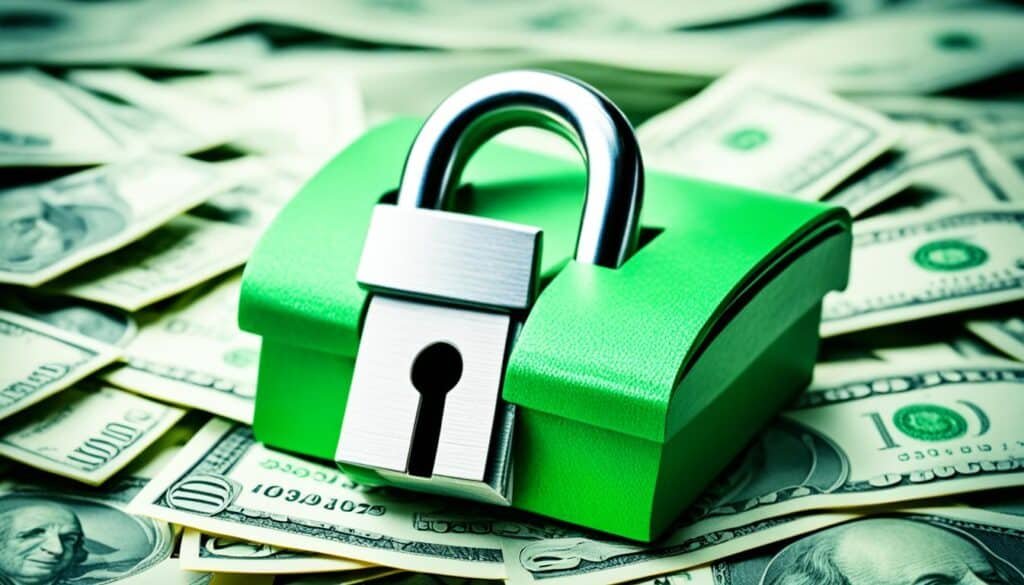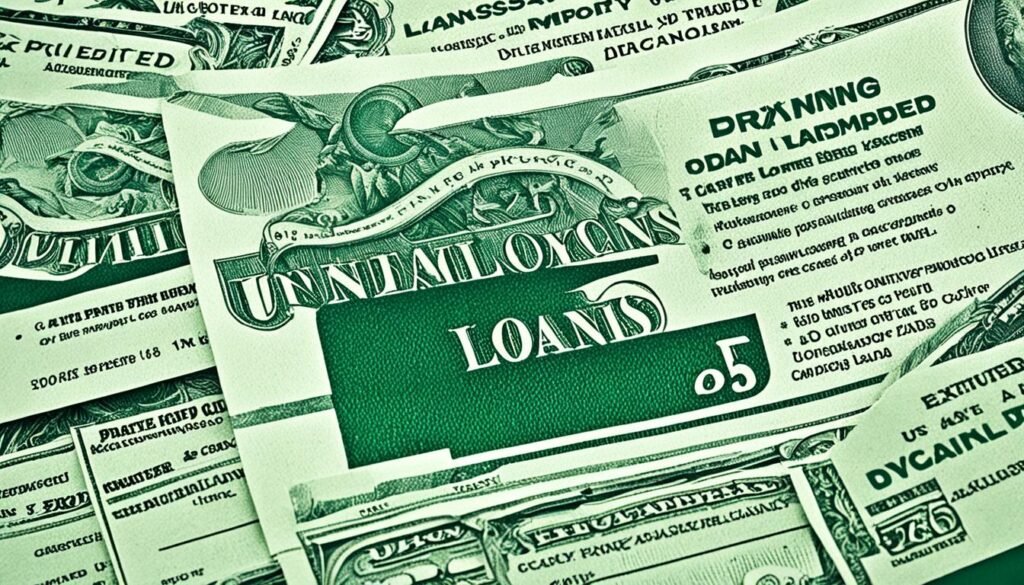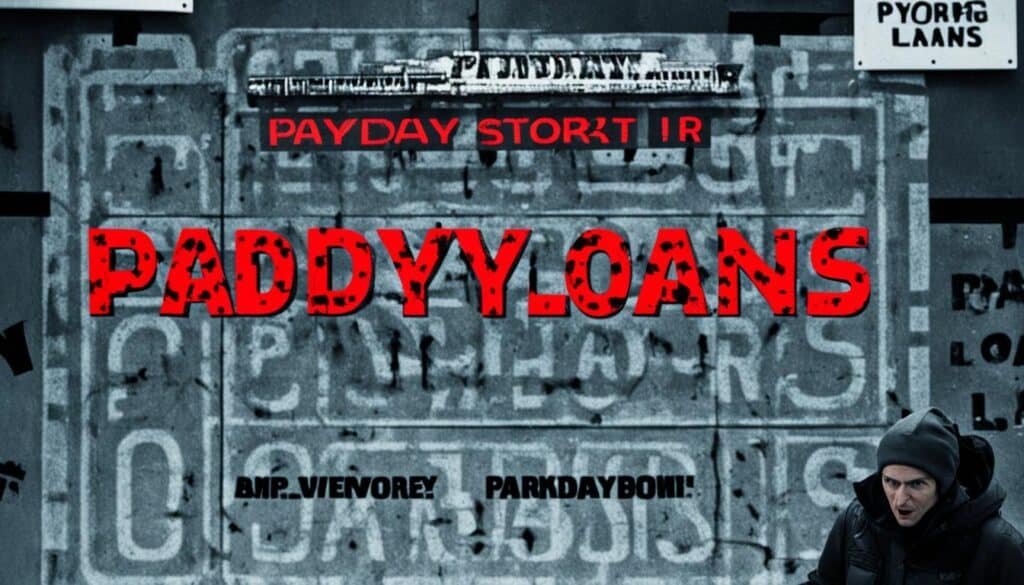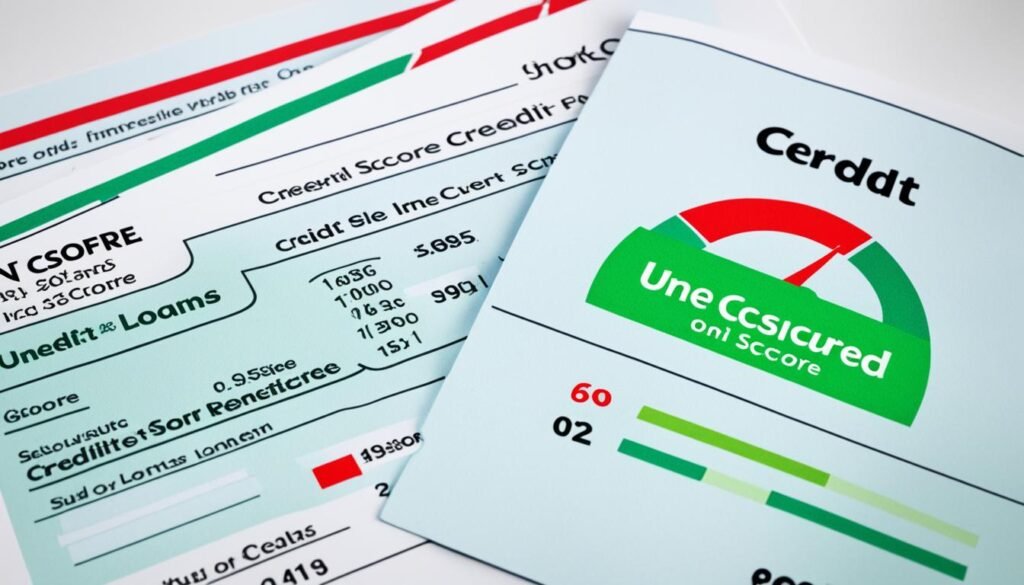When considering unsecured loans, it is important to be aware of the risks involved. Unsecured loans are loans that are not backed by collateral, such as a car or a house. As a result, lenders face greater risk when issuing these loans, which can lead to certain disadvantages for borrowers.
One of the main risks associated with unsecured loans is higher interest rates. Since lenders do not have any collateral to secure the loan, they often charge higher interest rates to offset the increased risk. This means that borrowers may end up paying more in interest over the life of the loan compared to secured loans.
Another risk to consider is the potential impact on your credit score. If you fail to make timely payments on your unsecured loan, it can negatively affect your credit. Missed or late payments can be reported to credit bureaus, which can lower your credit score and make it more difficult to obtain credit in the future.
It is important to navigate unsecured loans carefully to maintain your financial security. This includes making sure that you have a plan to repay the loan on time and in full. It is also crucial to consider your overall financial situation and whether taking on additional debt is the right decision for you.
Key Takeaways:
- Unsecured loans come with risks such as higher interest rates and potential impact on credit.
- Lenders charge higher interest rates on unsecured loans to compensate for the increased risk.
- Missed or late payments on unsecured loans can negatively affect your credit score.
- Navigating unsecured loans carefully and planning for repayment is essential for financial security.
- Consider your overall financial situation before taking on additional debt.
Understanding Interest Rates
When it comes to unsecured loans, understanding interest rates is crucial. An interest rate is the percentage of the loan amount that a borrower pays in addition to the principal amount borrowed. It is important to note that interest rates on unsecured loans can vary depending on several factors, including the borrower’s credit score and the loan terms.
One of the key factors that impacts the interest rate is the borrower’s credit score. A credit score is a numerical representation of an individual’s creditworthiness, ranging from 300 to 850. A higher credit score generally indicates a lower risk for lenders, resulting in lower interest rates on loans. On the other hand, a lower credit score may lead to higher interest rates as lenders perceive a higher risk in lending to individuals with lower credit scores. Therefore, it is essential for borrowers to maintain a good credit score to qualify for lower interest rates on unsecured loans.
Additionally, loan terms can also play a significant role in determining the interest rate. Loan terms refer to the duration of the loan repayment period. Generally, longer terms result in higher interest rates due to the increased risk for lenders over an extended period. On the other hand, shorter loan terms often come with lower interest rates as the lender takes on less risk. Therefore, borrowers should carefully consider the loan terms and its impact on the interest rate while making borrowing decisions.
“Understanding how interest rates are determined and how they can be affected by credit scores and loan terms is crucial in making informed borrowing decisions.”
To illustrate the relationship between credit score, loan terms, and interest rates, the following table provides an example of how different factors can influence the interest rates on unsecured loans:
| Credit Score | Loan Terms | Interest Rate |
|---|---|---|
| Excellent (750+) | Short-term (12 months) | 5.00% |
| Good (700-749) | Medium-term (24 months) | 7.50% |
| Fair (650-699) | Long-term (36 months) | 10.00% |
| Poor (600-649) | Long-term (36 months) | 15.00% |
As seen in the table, borrowers with excellent credit scores may enjoy lower interest rates, even with longer loan terms. Conversely, borrowers with poorer credit scores may face higher interest rates, particularly with longer repayment periods.
Understanding the relationship between credit score, loan terms, and interest rates enables borrowers to make informed decisions when applying for unsecured loans. By maintaining a good credit score and carefully considering loan terms, individuals can secure loans at more favorable interest rates, saving them money in the long run.
Early-Payoff Penalties
When it comes to paying off an unsecured loan early, borrowers should be aware of the possibility of early-payoff penalties. These penalties are charges imposed by some lenders if borrowers decide to pay off their loans before the agreed-upon term. The aim of these penalties is to compensate lenders for the interest they would have earned if borrowers had stuck to the original loan term.
Early-payoff penalties can be in the form of penalty fees or additional interest charges. These penalties can vary widely depending on the lender and the loan agreement. It’s crucial for borrowers to carefully review the terms and conditions of their loan agreement to understand if early-payoff penalties apply and factor them into their decision-making process.
While paying off a loan early may seem financially advantageous, it’s essential for borrowers to weigh the potential savings against the cost of early-payoff penalties. Calculating the overall financial impact is crucial to determine whether paying off the loan early is truly beneficial.
It’s important to note that not all lenders impose early-payoff penalties. Some lenders may have more lenient terms or no penalties at all, making them a better choice for borrowers who are planning to pay off their loans early.
Always review the loan agreement carefully and consult with the lender to fully understand the potential early-payoff penalties before deciding to pay off your unsecured loan ahead of schedule.
By considering early-payoff penalties and analyzing the potential cost savings, borrowers can make informed decisions about whether paying off their unsecured loans early is the right choice for their financial situation.
Upfront Fees

When considering unsecured loans, it’s important to carefully evaluate the upfront fees associated with each loan option. Many unsecured loans come with upfront fees, such as loan origination fees, which are charged by the lender at the beginning of the loan process. These fees can vary in amount and can significantly impact the overall cost of getting a loan.
Borrowers should be aware that loan origination fees are separate from interest rates and other charges. While interest rates determine the cost of borrowing over time, upfront fees are one-time charges that may be added to the loan amount or deducted from the loan disbursement.
It’s crucial to thoroughly review the terms and conditions of any loan agreement to understand the upfront fees involved. These fees should be fair and reasonable, aligned with market norms. Borrowers should consider whether the benefits of the loan outweigh the upfront fees and ensure that they have a clear understanding of the total cost of getting the loan.
“While upfront fees are a common part of the loan process, borrowers should carefully compare offers from different lenders to find the best overall terms and minimize the cost of getting a loan.”
To assist borrowers in making informed decisions, we’ve compiled a table that highlights the upfront fees associated with popular unsecured loan options:
| Lender | Loan Origination Fee |
|---|---|
| ABC Bank | $150 |
| XYZ Credit Union | No origination fee |
| 123 Loan Company | 1% of loan amount |
It’s important for borrowers to note that upfront fees may vary based on factors such as the loan amount, creditworthiness, and the lender’s policies. By carefully comparing the upfront fees of different lenders, borrowers can make an informed decision that aligns with their financial goals.
Privacy Concerns

When borrowing money, it is essential to consider the privacy concerns associated with different lenders. While bank and credit union loans typically come with strict privacy rules, other lenders may have less formal privacy policies. Protecting your personal and financial information should be a top priority.
Before applying for a loan, take the time to research the lender’s privacy rules and data protection practices. Look for lenders who prioritize data security and have clear guidelines in place to safeguard your information. This can help ensure that your sensitive details will be handled with care.
Understanding Lender Privacy Rules
Each lender may have its own set of privacy rules and practices. Some lenders may ask for extensive personal and financial information during the application process. It is important to understand how this information will be used and protected.
Look for lenders who are transparent about their privacy policies and are committed to keeping your data safe. They should clearly state how they collect, use, and share your information, as well as the measures they have in place to prevent unauthorized access or data breaches.
“Protecting your personal and financial information should be a top priority.”
Data Protection and Security Measures
When evaluating lenders, consider their data protection and security measures. Look for lenders who use encryption technology to safeguard your information when it is transmitted online. Encryption helps protect your data from unauthorized access and ensures that your personal and financial details remain confidential.
Additionally, reputable lenders will have measures in place to prevent identity theft and fraud. They may employ systems to detect suspicious activities and provide alerts in case of any potential breaches. This shows their commitment to maintaining your privacy and keeping your information secure.
Choose Privacy-Conscious Lenders
By choosing lenders with robust privacy policies and stringent data protection measures, you can have peace of mind knowing that your personal and financial information is in safe hands. Look for lenders that adhere to industry best practices and have a track record of prioritizing privacy and data security.
Keep in mind that protecting your privacy is a shared responsibility. As a borrower, it is important to take steps to safeguard your information as well. Avoid sharing sensitive data over unsecured networks or with unverified individuals or organizations.
Insurance Offers

When taking out an unsecured loan, borrowers may encounter additional insurance offers from lenders. These insurance products are designed to protect the loan in the event of unforeseen circumstances, providing borrowers with peace of mind.
Loan protection insurance is a common insurance offer that borrowers may come across. This type of insurance is specifically tailored to cover the loan repayments in case the borrower becomes unable to make payments due to certain circumstances, such as unemployment, disability, or death. It can provide financial security and ensure that the borrower’s financial obligations are met even if they face unexpected challenges.
While loan protection insurance can offer valuable protection, it is important for borrowers to carefully evaluate these insurance offers. Comparing them to other insurance options, such as disability insurance, can help borrowers determine if they are getting the best coverage at the most affordable price.
“It’s crucial to weigh the cost of insurance against the potential risks before making a decision,” advises Sarah Thompson, a financial advisor at Wealth Wise. “Borrowers should consider factors such as the cost of insurance, coverage limits, and any exclusions or waiting periods that may apply.”
By thoroughly researching and comparing insurance offers, borrowers can ensure they are making informed decisions about protecting their loans. It is important to consider the cost of insurance and weigh it against the potential risks and benefits. Additionally, borrowers should carefully read and understand the terms and conditions of any insurance policy before making a commitment.
Precomputed Interest

When it comes to calculating interest on a loan, there are different methods that lenders use. Two common methods are precomputed interest and simple interest.
In the case of precomputed interest, lenders use the original payment schedule to calculate interest, regardless of how much the borrower has actually paid. This means that even if you make extra payments or pay off the loan early, the interest is still calculated based on the original schedule. Precomputed interest can be beneficial for lenders as it ensures a fixed and predictable stream of interest income.
On the other hand, simple interest looks at the current loan balance to calculate interest. This means that the interest is only calculated on the remaining principal balance, taking into account any additional payments made by the borrower. Simple interest can be advantageous for borrowers who plan to pay off their loan early, as it reduces the total interest paid over the life of the loan.
It is important for borrowers to understand how the interest on their unsecured loan is being computed. By knowing whether the loan uses precomputed or simple interest, borrowers can make informed decisions about their repayment strategy. If you plan to pay off the loan early, simple interest may be more beneficial, as it can save you money on interest payments.
Here is a table comparing precomputed interest and simple interest:
| Method | Calculation | Impact of Early Payments |
|---|---|---|
| Precomputed Interest | Based on original payment schedule | Interest is fixed, regardless of additional payments |
| Simple Interest | Based on current loan balance | Interest is reduced with additional payments |
Understanding the interest calculation method used by your lender can help you make more informed decisions about your unsecured loan. Whether you choose a loan with precomputed interest or simple interest, it is important to consider your repayment goals and financial situation before making a decision.
Payday Loans

When you find yourself in need of quick cash, payday loans may seem like a convenient solution. These short-term personal loans are designed to provide immediate funds, typically for a period of one to two weeks until your next paycheck. However, it’s crucial to understand the potential pitfalls that come with payday loans.
Payday loans are notorious for their high interest rates, which can be significantly higher than those of traditional loans. This means that you’ll end up paying back a substantial amount in interest fees. The high interest rates associated with payday loans have led to concerns about them being exploitative and trapping borrowers in cycles of debt.
One of the reasons payday loans can be so dangerous is their short repayment window. The loan is typically due in full on your next payday, which can be challenging for many borrowers. If you’re unable to repay the loan by the due date, the lender may offer rollovers or extensions, but this comes with additional costs and fees, further increasing your debt.
Payday loans often trap borrowers in a cycle of debt, causing financial stress and making it difficult to break free.
Due to the high interest rates and unfavorable terms, financial experts generally advise against taking out payday loans unless it is absolutely necessary. If you’re facing a financial emergency, consider exploring alternative options, such as borrowing from friends or family, negotiating a payment plan with your creditors, or seeking assistance from non-profit organizations that provide financial support.
Critical Takeaways:
- Payday loans are short-term personal loans with high interest rates.
- These loans often trap borrowers in cycles of debt due to their short repayment window.
- Financial experts generally advise against payday loans due to their high interest rates and unfavorable terms.
- If you’re facing a financial emergency, consider exploring alternative options before turning to payday loans.
By understanding the risks and exploring alternative options, you can make informed decisions to protect your financial well-being.
Unnecessary Complications

When it comes to personal loans, some lenders may try to entice borrowers with unnecessary complications and additional features. These can include offers for payment holidays or cash back incentives. While these may seem appealing at first glance, borrowers should exercise caution and carefully consider the loan terms before accepting them.
A personal loan should be a straightforward and simple product, designed to provide financial assistance without unnecessary complexities. Borrowers should prioritize understanding the loan’s interest rates, repayment terms, and any potential fees before committing to a loan agreement.
Complex loan terms can lead to confusion and contribute to financial stress, making it difficult for borrowers to navigate the loan successfully. It’s important to fully comprehend the terms and conditions of a personal loan to ensure that it aligns with your financial goals and capabilities.
Additionally, it’s worth noting that additional features offered by lenders may come at a cost. While payment holidays might provide temporary relief from repayments, they can extend the overall loan duration and result in higher interest charges. Cash back offers may also have terms and conditions that affect the long-term affordability of the loan.
Borrowers should take the time to review and fully understand the loan agreement, including any additional features, before making a decision. It’s essential to consider the long-term implications and evaluate whether the extra features outweigh the potential drawbacks and unnecessary complications they may introduce.
Considering the Loan Terms
When evaluating the loan terms, borrowers should pay close attention to:
- Interest Rates: Ensure the interest rates offered are competitive and reasonable for your financial circumstances.
- Repayment Period: Evaluate the loan’s repayment period to ensure it aligns with your ability to make timely payments.
- Fees: Understand any applicable fees, such as origination fees, processing fees, or prepayment penalties, and assess their impact on the overall cost of the loan.
By carefully considering and understanding the loan terms, borrowers can avoid unnecessary complications and make informed decisions that best serve their financial needs.
Loan Terms Comparison
| Loan Provider | Interest Rate | Repayment Period | Fees |
|---|---|---|---|
| Lender A | 6.25% | 3 years | $250 origination fee |
| Lender B | 5.75% | 5 years | No additional fees |
In the table above, borrowers can compare two potential loan providers and evaluate their interest rates, repayment periods, and applicable fees. This side-by-side comparison helps borrowers make an informed choice based on their specific financial situation.
By carefully considering the loan terms and avoiding unnecessary complications, borrowers can secure a personal loan that meets their needs while maintaining financial stability.
Impact on Credit Score

Taking out an unsecured loan can have a significant impact on your credit score. It is important to understand how missed or late payments on the loan can cause your credit score to decrease. These negative events are reported to the credit bureaus and can have long-term consequences.
If you miss a payment or make a late payment on your unsecured loan, it can stay on your credit report for up to seven years. This can make it more difficult for you to obtain credit in the future and may result in higher interest rates on future loans.
It is crucial for borrowers to make timely payments on their unsecured loans to maintain a good credit score. By paying your loan installments on time, you can demonstrate responsible financial behavior and build a positive credit history.
“Late payments and missed payments can have a significant impact on your credit score. It is essential to make your unsecured loan payments on time to maintain a good credit standing.”
If you find yourself struggling to make your loan payments on time, it is important to contact your lender as soon as possible. They may be able to offer assistance or alternative repayment options to help you avoid negative impacts on your credit score.
Remember that the credit reporting system is designed to reflect your creditworthiness and financial responsibility. By being proactive in managing your unsecured loan payments, you can protect your credit score and financial stability.
| Impact on Credit Score | Explanation |
|---|---|
| Missed Payments | Missed payments on your unsecured loan can cause your credit score to decrease. These negative events are reported to credit bureaus and can stay on your credit report for up to seven years. |
| Late Payments | Similarly, making late payments on your unsecured loan can also have a negative impact on your credit score. It is important to pay your loan installments on time to avoid this. |
| Builds Positive Credit History | By making timely payments, you can establish a positive credit history and demonstrate responsible financial behavior. This can improve your credit score over time. |
Keeping a good credit score is essential for your financial well-being. It can affect your ability to secure favorable interest rates on future loans, obtain credit cards, or even rent an apartment.
Therefore, it is crucial to be diligent in making your unsecured loan payments on time and maintaining a strong credit score.
How do unsecured loans work?
Unsecured loans are loans granted without collateral, relying solely on the borrower’s creditworthiness. Unlike secured loans, where assets secure the loan, unsecured loans are based on factors such as credit history, income, and employment status. Lenders assess these factors to determine the borrower’s ability to repay. Interest rates for unsecured loans are often higher than secured loans due to the increased risk for the lender. Repayment terms vary but typically involve fixed monthly payments over a set period. If a borrower defaults, the lender may pursue legal action but lacks specific collateral to seize, making unsecured loans riskier for lenders.
The best unsecured personal loans and rates.
The best unsecured personal loans offer competitive interest rates and flexible terms tailored to individual financial needs. Lenders assess factors like credit score, income, and employment history to determine eligibility and rates. Online lenders often provide convenient application processes and quick approval times. Compare offers from multiple lenders to find the most favorable rates and terms. Additionally, consider factors such as origination fees, prepayment penalties, and customer service quality. Ultimately, the best loan for one person may not be the best for another, so it’s essential to evaluate options carefully to secure the most advantageous terms.
Types of Unsecured Loans
Unsecured loans encompass various types, typically not backed by collateral. Personal loans are versatile, used for any purpose and based on creditworthiness. Credit cards provide revolving credit without collateral, ideal for everyday purchases. Student loans fund education expenses without collateral, with repayment typically deferred until after graduation. Peer-to-peer loans involve borrowing from individuals online, often for personal use or debt consolidation. Additionally, payday loans offer short-term borrowing without collateral, usually repaid with the borrower’s next paycheck. These loans cater to diverse needs but carry higher interest rates due to the lack of collateral, emphasizing the importance of responsible borrowing.
How to get an unsecured personal loan
To secure an unsecured personal loan, start by checking your credit score and history to gauge eligibility. Research lenders offering such loans and compare their terms, interest rates, and eligibility criteria. Prepare necessary documentation such as proof of income, employment details, and identification. Apply online or in-person with the chosen lender, providing accurate information and completing the application thoroughly. Upon approval, review the loan agreement carefully, understanding repayment terms, interest rates, and any fees involved. Once accepted, funds are typically disbursed directly to your bank account, allowing you to utilize them for various personal expenses.
Plus, get custom offers from up to 5 lenders in minutes.
Unlock personalized loan offers from five lenders swiftly. Simply provide your details and preferences, and within minutes, receive tailored offers catering to your needs. This streamlined process saves time and effort, ensuring you access the best loan options available. Compare rates, terms, and features conveniently to make an informed decision. With multiple offers at your fingertips, you gain the flexibility to choose the most suitable loan with confidence. Whether it’s for a personal project, debt consolidation, or unexpected expenses, finding the right loan has never been easier. Access custom offers now and take control of your financial journey.
Also Read: Self Employment Loans: Quick Funding Solutions
Conclusion
When considering unsecured loans, borrowers must be aware of the risks involved in order to protect their financial security. These loans can be a helpful financial tool, providing much-needed funds for various purposes. However, it is crucial to navigate these loans wisely and make informed decisions.
One of the main risks associated with unsecured loans is higher interest rates. Borrowers must carefully evaluate the terms and conditions, taking into account their credit score and the impact it may have on the interest rate. By understanding the factors that determine the interest rate, borrowers can make educated choices that align with their financial goals.
In addition to interest rates, borrowers must also be mindful of the potential impact on their credit. Late or missed payments on unsecured loans can negatively affect credit scores. To ensure financial security, prompt and regular payments are essential. By diligently managing payments, borrowers can safeguard their creditworthiness and maintain a strong financial foundation.
To summarize, unsecured loans offer opportunities for borrowers to achieve their financial objectives. However, they also present risks that must be carefully navigated. By considering the potential risks, understanding the terms and conditions, and making timely payments, borrowers can utilize unsecured loans while safeguarding their financial security.
FAQs
Q: What is an unsecured personal loan?
A: An unsecured personal loan is a type of loan that is not backed by collateral, such as a car or house.
Q: How can I apply for an unsecured personal loan?
A: You can apply for an unsecured personal loan through various lenders, including banks, credit unions, and online lenders.
Q: What are the cons of unsecured loans?
A: The cons of unsecured loans include higher interest rates compared to secured loans and the potential risk of default if you fail to make timely payments.
Q: Can I get an unsecured loan with bad credit?
A: It may be challenging to qualify for an unsecured loan with bad credit, as lenders typically prefer borrowers with good to excellent credit scores.
Q: What are the pros and cons of unsecured loans?
A: Pros of unsecured loans include not requiring collateral, while cons include higher interest rates and potential difficulty obtaining approval with bad credit.
Q: How do loan interest rates for unsecured loans compare to other types of loans?
A: Interest rates for unsecured loans are typically higher than those for secured loans, such as mortgages or car loans, due to the lack of collateral.
Q: What is the maximum loan amount I can get with an unsecured personal loan?
A: The maximum loan amount for an unsecured personal loan varies by lender and is usually determined based on factors such as your creditworthiness and income.
